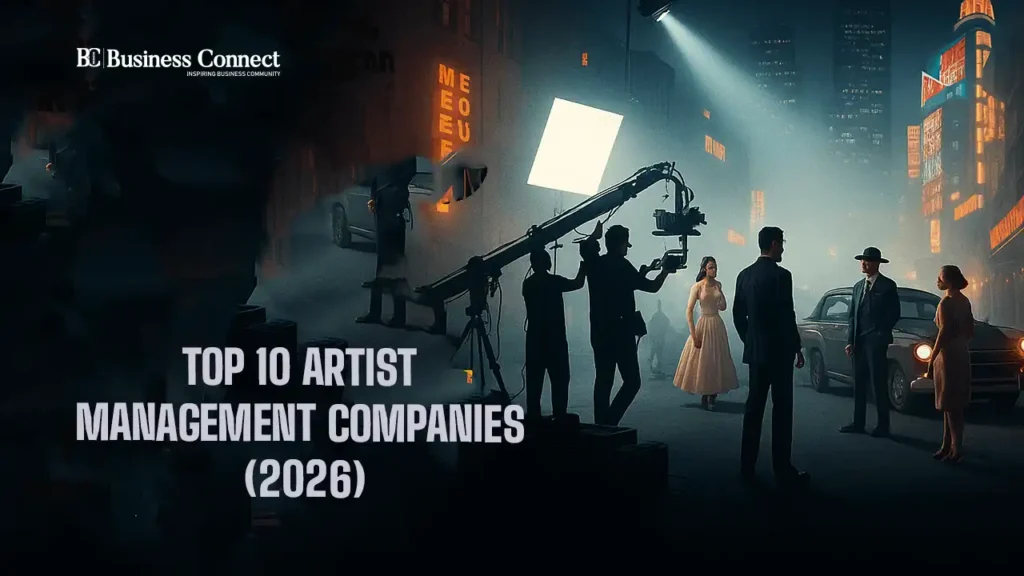Top 10 Artist Management Companies in 2026: The Ultimate Industry Power List
-by Jaya Pathak
An artist management company is basically a professional agency which guides the professional careers of artists. Their chief work involves strategic career planning, business negotiation and brand building. Henceforth, we can say that it stands as a bridge between the artist and entertainment industry.
In this blog, we will discuss top 10 artist management companies. Here presenting the list: –
1) Collective Artists Network (CAN)

Collective Artists Network operates as a multi‑faceted talent powerhouse, representing leading artists across cinema, music, digital creators, and sports while building properties and services that influence a meaningful share of the popular culture market. External assessments describe CAN as a large, category‑spanning representation business with access to marquee talent and brand partnerships across formats and regions.
2) Dharma Cornerstone Agency (DCA)

DCA, formed as a joint deal between Dharma Productions and Cornerstone, operates at the centre of entertainment marketing and talent management with a carefully selected group of actors, singers, and creators. Since its launch, leadership has reported steady year‑on‑year growth and a model that joins artist representation with brand strategy and production support, delivering genuinely end‑to‑end service.
3) OML (Only Much Louder)
OML’s evolution from live events and music to comedy and creator management makes it a distinctive platform representing comedians, creators, and multidisciplinary talent with roots in IP such as NH7 Weekender. The company manages a broad roster of comedians and creators and has been recognized for building properties and talent solutions across live, branded content, and digital networks.
4) Exceed Entertainment
Founded in 2005, Exceed has grown from an artist management agency into a multi‑platform management and entertainment marketing company increasing influencer programs, content packaging, and merchandising. Its portfolio and case histories explains celebrity brand building and long‑running collaborations that integrate representation with commercial strategy.
5) Cornerstone Sport & Entertainment
Cornerstone is a talent representation and brand consultancy with deep roots in sports and entertainment, managing leading athletes and building commercial partnerships across endorsements and events. The firm’s roster and positioning underscore long‑term athlete management and integrated marketing services, with references to marquee Indian sports talent over time.
6) TM Talent Management (Tarsame Mittal)

TM Talent Management specializes in the music and live entertainment industry, representing prominent Bollywood and live performers with a 360‑degree approach to touring and brand collaborations. The company’s founder links TM’s growth to transparent processes and comprehensive services for musicians at different career stages.
7) TOABH Talent Management
TOABH operates at the intersection of fashion, film, and brands, offering artist management, casting, and campaign services for models, actors, and creative specialists. Client‑facing materials and directories present TOABH as a full‑service partner delivering celebrity and influencer programs, production support, and brand collaborations.
8) One Digital Entertainment
One Digital is a pan‑regional creator and artist management company that pairs talent development with brand solutions, distribution, and proprietary tools for publishing and monetization at scale. Public profiles note thousands of creators on the network and a portfolio spanning content, podcasts, merchandising, and category rollups in the broader creator economy.
9) Black Hat Talent
Black Hat focuses on talent booking and management for celebrities and other artists to perform in in weddings, corporate events, and brand campaigns, reflecting the strength of live and experiential formats. Industry lists consistently reference the company among active, pan‑India booking‑led artist managers in the events value chain.
10) Panache Entertainment
Analyst roundups cite Panache among India’s active talent management agencies supporting artist representation and projects across entertainment and brand partnerships. Such compilations place Panache alongside larger networks, indicating a diversified marketplace that includes boutique and mid‑sized firms with focused service lines.
What sets leaders apart in 2026?
- Integrated services: Representation, endorsements, production support, events, and IP creation increasingly sit under one roof to improve speed and deal quality across categories.
- Category depth: Specialist tracks in sports, music, fashion, and the creator economy allow tailored playbooks while preserving scale advantages.
- Brand fluency: Agencies emphasizing long‑term brand fit, measurement, and multi‑asset deals outperform one‑off campaigns in retention and revenue per talent.
- Platform readiness: Data‑aware workflows, creator tools, and content packaging capabilities turn representation into repeatable commercial outcomes.
FAQs
What is the difference between talent management and a booking agency?
Talent management covers strategy, branding, content, and long‑term dealmaking, while booking focuses on securing appearances or performances; many leading firms operate both to control quality and economics.
Which agencies are best for creators rather than film actors?
Creator‑led networks such as OML and One Digital specialize in digital formats, audience development, and platform‑native monetization for comedians, creators, and multidisciplinary talent.
Who focuses on music and live acts?
TM Talent Management concentrates on Bollywood and live performers with a 360‑degree approach to touring and brand partnerships in the music ecosystem.
What if I need fashion and brand campaigns?
TOABH combines fashion, film, and brand mandates, offering casting, campaign execution, and celebrity collaborations for fashion‑adjacent categories.
Are sports and entertainment converging inside agencies?
Cornerstone exemplifies a combined approach, managing athletes while structuring endorsements and entertainment marketing, often overlapping with film and creator programs via joint ventures.
How do large networks differentiate in a crowded market?
Scaled players like Collective and DCA emphasize curated rosters, brand strategy, production support, and proprietary IP to move beyond transactional deals.
Which companies are strongest on live events and IP?
OML’s legacy in live festivals and touring IP, paired with creator management, remains a reference point for building recurring, multi‑city properties.
8. How do these agencies select the artists they want to represent?
Selection is based on:
Unique talent or niche
Growth potential
Audience engagement
Market demand
Personality and professionalism
High-impact creators or artists with consistent output are typically preferred.
9. What is the role of data and analytics in modern artist management?
Data helps agencies track audience behavior, platform performance, brand fit, and revenue growth. Modern managers use analytics dashboards, content tools, and predictive insights to make better decisions.
10. Do artist management companies also handle PR and media image?
Many top agencies include PR, image consulting, interviews, reputation management, and digital brand polishing as part of 360-degree services—especially for actors, influencers, and musicians.
11. How long does an artist-management contract usually last?
Contracts can range from 1 year to 5 years, depending on the scope of services, investment required, and artist’s career stage. Some creators prefer non-exclusive deals for flexibility.
12. Can an artist switch management agencies later?
Yes, but only after fulfilling contractual obligations such as notice period, pending campaigns, or revenue settlements. It’s crucial to review exit clauses before signing.
13. Are small or boutique agencies better than large networks?
Boutique agencies offer personalized attention, while large networks provide bigger brand access, production support, and multi-category opportunities. The best choice depends on the artist’s career goals.
14. What trends will shape artist management in 2026 and beyond?
AI-driven content optimization
Creator merchandise & IP development
Virtual concerts and metaverse events
Cross-category collaborations
Long-term brand partnerships over one-off deals
15. Do these agencies help with legal and contract support?
Yes. Most reputable agencies assist with legal reviews, contract drafting, intellectual property rights, royalty agreements, and negotiation of brand deliverables.





